The HIFU machine is a revolutionary new high-intensity focused ultrasound technology designed device that can penetrate deep SMAS fascia skin tissue and project high heat to the appropriate place, the deep dermis, to stimulate the skin to produce more collagen, tightening the skin and making it appear more youthful than it actually was.
This article will introduce you to HIFU, discuss its advantages, and explain the factors that affect the cost of HIFU. See the list of recommended resources at the bottom of this article to locate a top-notch HIFU salon or specialist in your area.
What exactly is HIFU?
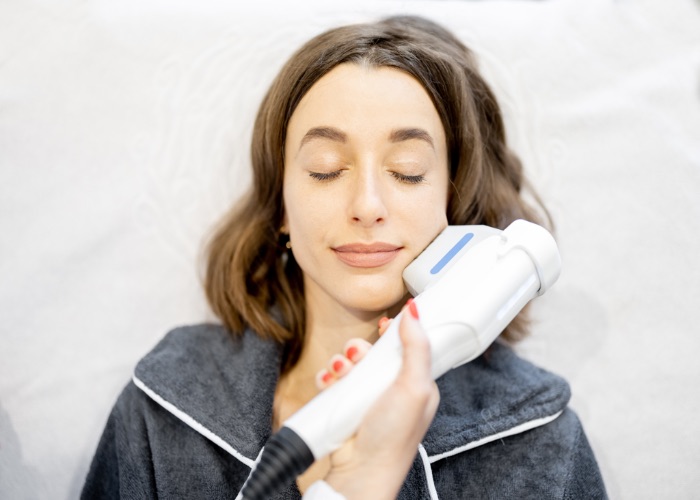
HIFU is an abbreviation for High-Intensity Focused Ultrasound. It is known as the world’s most advanced non-surgical facelift, with virtually no downtime.
This treatment is much more thorough than RF Microneedling. With HIFU, ultrasound energy is focused and sent deep into the skin, where it generates a high enough temperature to solidify the muscle beneath. This method uses ultrasound to precisely heat a targeted area in a short amount of time by depositing energy there in the form of tiny deposits. The deep dermal tissue of your skin reacts to this energy by inducing the production of new, compact collagen fibers. Consequently, your skin’s elasticity and firmness will gradually increase and tighten due to this. When skin elasticity increases, fine lines, and wrinkles become less noticeable. The skin’s texture improves as it becomes smoother, shinier, and firmer. The skin’s firmness and tightness are significantly enhanced and remain after a single treatment. It’s great for getting rid of that double chin, avoiding sagging skin around the jawline, tightening up loose skin on the face, and even giving yourself a cheek lift.
The treatment’s skin tightening effects are noticeable immediately and continue to improve over time. This means that the cosmetologist can start the regenerative process with just a single treatment, but the full effects won’t be seen for at least two to three months, and there is evidence to suggest that it can continue for as long as six months.
What is the primary application of HIFU?
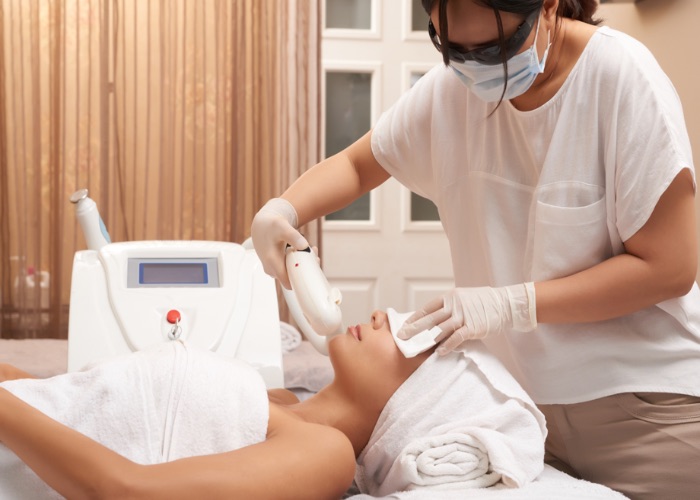
For the most effective tightening and lifting of skin around the jowls, double chin, and brow, and for the removal of deep wrinkles, HIFU is your best bet. Using this method regularly can help with a variety of skin issues, including the appearance of fine lines and wrinkles, pore size, superficial scars, and even acne.
When used on the body, HIFU is more effective than RF at lifting and tightening saggy skin because it targets the underlying muscle. Furthermore, HIFU can be used to help the body lose unwanted fat.
Things to Do Before HIFU Procedure
Skin that has been recently tanned or sunburned cannot be treated with HIFU since the device cannot penetrate the damaged epidermis.
Further, it is best to avoid using any chemicals that may irritate the skin, as this could delay or even prevent treatment.
If you are taking antibiotics and are considering getting the HIFU skin treatment, you may need to stop using them. Your skin may become more sensitive to light after taking antibiotics.
In this scenario, you might need to delay treatment for 2 weeks until after the antibiotics have run their course.
The day before the HIFU treatment
HIFU is a reliable and successful method for doing facelifts. The procedure lasts anywhere from 30 minutes to 90 minutes and involves focusing ultrasound energy on certain parts of your face and body. Both patients and therapists must follow specific procedures to guarantee everyone’s well-being and the best possible outcomes from treatment.
First and foremost, people who want to have HIFU treatment can’t have a history of cold sores. Having cold sores will hinder your recovery. If the patient has a fever, HIFU treatment cannot be administered.
Treatment in such circumstances is postponed until the cold sore has healed or the fever has broken.
Day of the HIFU treatment
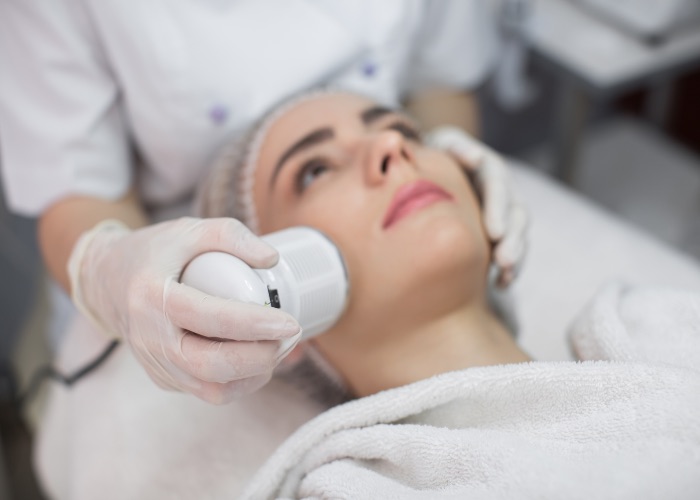
Avoid using any moisturizers or cosmetics on the day of your treatment.
Getting to the HIFU treatment center early is recommended, even if you are in good health and have no known medical conditions that could affect the outcome of your treatment.
Doing this regularly will help you maintain a state of calm and eliminate any anxiety you may be experiencing. Since HIFU facelift treatment is non-invasive and pain-free, you may wonder why anxiety is even a problem.
However, some patients experience anxiety when thinking about treatment procedures; these patients must take anti-anxiety medication prior to treatment.
Clients who require anxiety medication must be accompanied by a responsible party who can drive them home following treatment.
Post-HIFU Care Plan
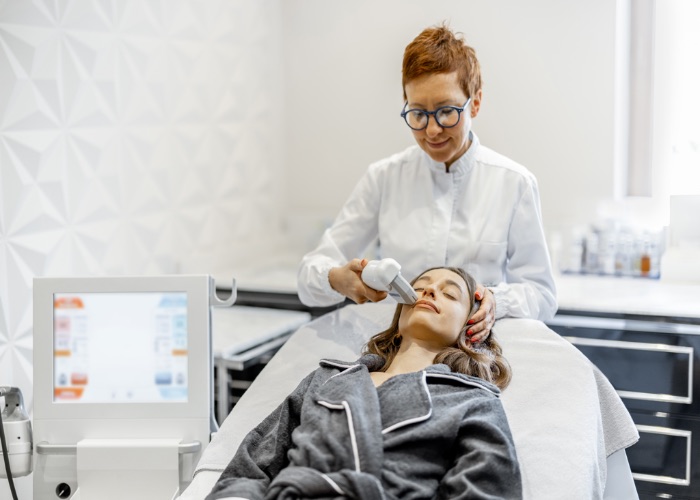
Clients who have undergone HIFU skin treatment should know how to take care of their bodies after the procedure to avoid complications and side effects that can lessen the treatment’s efficacy.
Because doing so will improve the odds of success, this is especially important. Let’s quickly go over some rules that patients who’ve had HIFU treatment must follow religiously.
They should do that if they want to make the most of the treatment they just got.
1. Stay out of the sun
If you’ve had HIFU skin treatment, you should avoid direct sunlight and extreme temperatures for a while.
The risk of hyperpigmentation, sunburn, and skin damage can be reduced by staying out of direct sunlight, which is why this advice is so common.
Sunblock cream should be used, as it will help shield the skin from the sun’s harmful ultraviolet rays.
It is essential to keep doing this until the process of making the skin tighter is finished.
2. Stop drinking for a while
You need to ease up on your liver. After undergoing treatment, do not partake in alcoholic beverages.
The liver has to work harder when you drink alcohol. Fat that has been rendered inactive during treatment must be metabolized by the liver afterward.
If you drink alcohol, your liver will have to process that on top of the deactivated fat.
Alcohol causes your liver to work harder than it needs to and also causes your blood to become less dense.
Due to difficulties with blood clotting, excessive bleeding may result from less dense blood.
The consumption of alcoholic beverages should be avoided at all costs.
3. Avoid Scratching Your Skin
This should be avoided despite the tempting urge to scratch an itch after a treatment. Scratching now could result in skin damage because your skin is particularly delicate. Scars, if any, should be left to fade away on their own.
Attempting to do so could result in a severe injury and subsequent infection. After your treatment, your skin is especially sensitive, and you should avoid scratching it.
4. Consume More Water
Water, they say, is the source of all life. Since water is recommended after the HIFU treatment, that’s what you should drink most of afterward. You should drink water before any other liquids.
Collagen production in the body can be sped up with the help of water, another factor that will speed up your recovery. It is important to stay hydrated, so gulp down as many glasses of water as you can.
5. Avoid taking steaming baths and showers
Bathing in cold water has the dual benefit of retaining your skin’s natural protective oil and warding off irritation. When possible, use lukewarm water instead of hot water, as it will help your skin recover faster if irritated by the latter. You may have preferred hot showers in the past, but from now on, you should always avoid them. You need permission to proceed until at least then.
How much does HIFU cost in Canada?
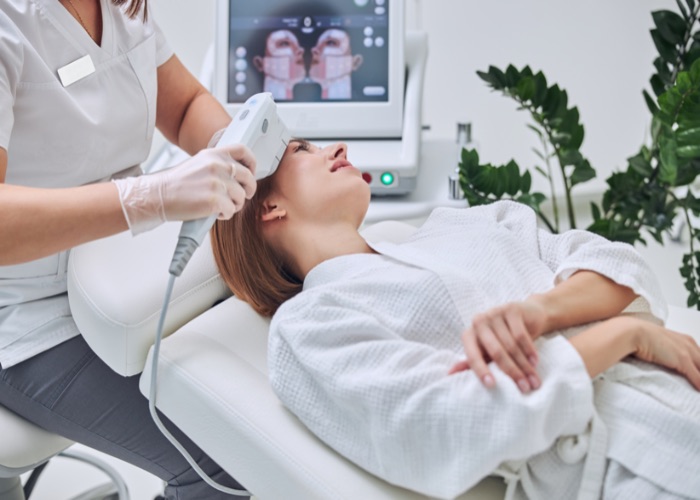
In Canada, a session of HIFU skin tightening can set you back at around $600. With the option of booking three appointments at once for $1500. Treatment regions, doctors’ skills and experience, the brand of HIFU, number of shots, location, and consultation fees are some common factors influencing the price of HIFU treatment in different parts of the world. HIFU can be used on both the entire face and the neck.
However, specialists typically divide the face into sections like the “eye region” and the “lower face” to ensure that each area receives the attention it needs.
It all depends on how severe the condition is and what kind of treatment you get. The lower the cost, the smaller the region. Prices for treatments often do not include additional charges such as consultation fees or the cost of operating a clinic.
Frequently Asked Questions:
- Does HIFU cause fat loss?
HIFU is a permanent fat loss treatment. It uses heat to destroy fat cells in a specific target area, such as the stomach or thighs. It burns fat and promotes collagen growth, making the skin tighter and firmer.
- Are HIFU results instant?
Three months after finishing all of their treatments, most people have reached their full potential. Compared to a surgical face lift, HIFU is an excellent choice if you’re looking for a treatment that doesn’t involve any downtime or discomfort.
- Is HIFU covered by Medicare?
Commercial health insurance plans and Medicare do not typically cover HIFU at this time for the vast majority of patients. As of the end of 2018, Medicare no longer reimburses patients for the majority of the cost of HIFU, despite having done so from roughly the middle of 2017 through the end of 2018.
Where to get HIFU near me (Toronto, Vancouver, Calgary, Edmonton, …)
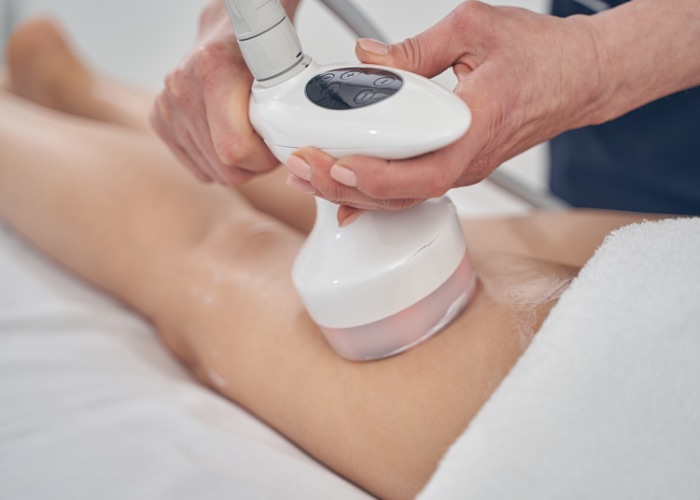
We tried to provide you with all the information about microneedling that you could possibly require in this article. This article should have provided you with enough knowledge about microneedling for you to be able to decide on the wellness of your skin.
Beautster simplifies the process of finding microneedling specialists and microneedling spas near you.
Click here to have a look at some before and after pictures of their clients, check their availability, and book a microneedling session right now to guarantee your safety and get the flawless skin of your dreams!